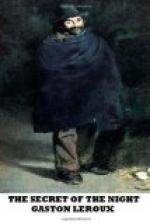“Here they are,” said the general. All turned. Michael and Boris were coming up the steps. Rouletabille, who was in a shadowed corner under the main staircase, did not lose a single play of muscle on the two faces which for him were two problems to solve. Both faces were smiling; too smiling, perhaps.
“Michael! Boris! Come here,” cried Feodor Feodorovitch. “What have you done with the grapes from monsieur le marechal?”
They both looked at him upon this brusque interrogation, seemed not to understand, and then, suddenly recalling, they declared very naturally that they had left them on the garden table and had not thought about them.
“You forgot my caution, then?” said Count Kaltzof severely.
“What caution?” said Boris. “Oh, yes, the washing of the grapes. Doucet’s caution.”
“Do you know what has happened to Doucet with those grapes? His eldest son is dead, poisoned. Do you understand now why we are anxious to know what has become of my grapes?”
“But they ought to be out there on the table,” said Michael.
“No one can find them anywhere,” declared Matrena, who, no less than Rouletabille, watched every change in the countenances of the two officers. “How did it happen that you went away yesterday evening without saying good-bye, without seeing us, without troubling yourselves whether or not the general might need you?”
“Madame,” said Michael, coldly, in military fashion, as though he replied to his superior officer himself, “we have ample excuse to offer you and the general. It is necessary that we make an admission, and the general will pardon us, I am sure. Boris and I, daring the promenade, happened to quarrel. That quarrel was in full swing when we reached here and we were discussing the way to end it most promptly when monsieur le marechal entered the garden. We must make that our excuse for giving divided attention to what he had to say. As soon as he was gone we had only one thought, to get away from here to settle our difference with arms in our hands.”
“Without speaking to me about it!” interrupted Trehassof. “I never will pardon that.”
“You fight at such a time, when the general is threatened! It is as though you fought between yourselves in the face of the enemy. It is treason!” added Matrena.
“Madame,” said Boris, “we did not fight. Someone pointed out our fault, and I offered my excuses to Michael Nikolaievitch, who generously accepted them. Is that not so, Michael Nikolaievitch?”
“And who is this that pointed out your fault?” demanded the marshal.
“Natacha.”
“Bravo, Natacha. Come, embrace me, my daughter.”
The general pressed his daughter effusively to his broad chest.
“And I hope you will not have further disputing,” he cried, looking over Natacha’s shoulder.
“We promise you that, General,” declared Boris. “Our lives belong to you.”




